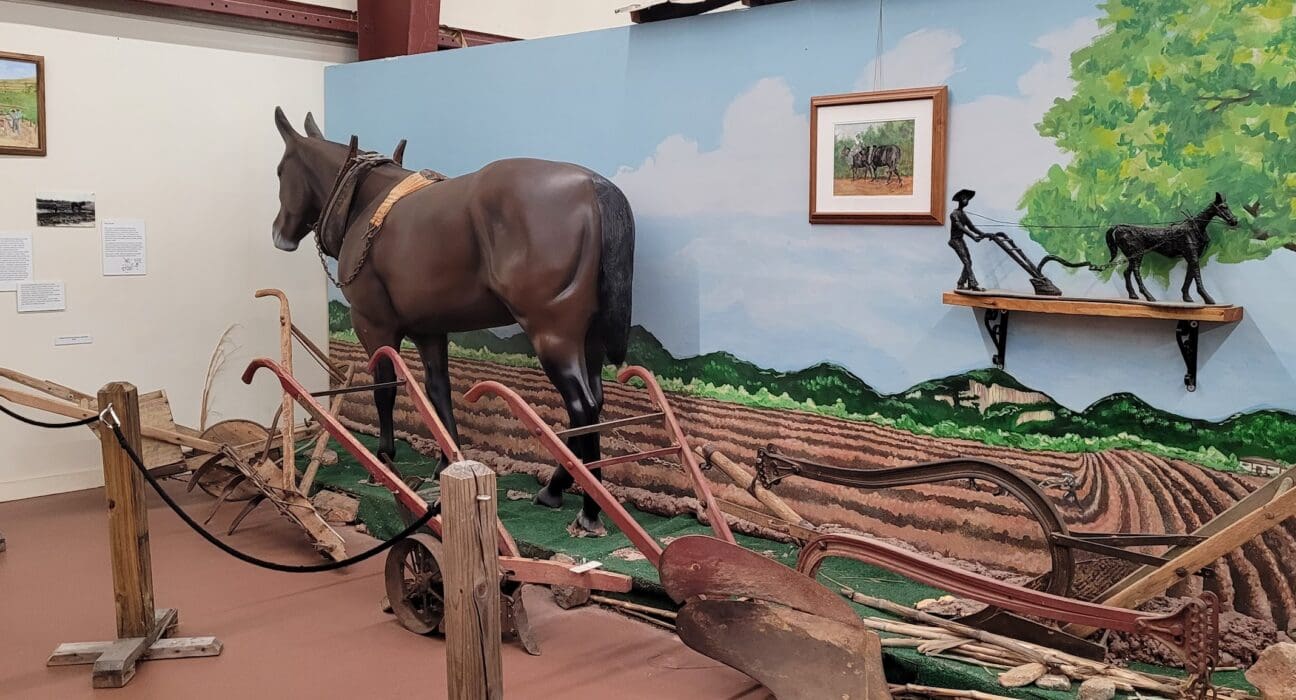Bart Garrison Agricultural Museum of South Carolina in Pendleton, South Carolina
Knowing where your food comes from is one of the basic skills needed for survival. If you ask most kids today, where their hamburgers come from, you will hear them name their favorite fast food place. This lack of knowledge is why the Bart Garrison Agricultural Museum is a great place to take your kids, so they can learn so much about farming and farm life. At their fingertips children can discover the history and future of farming in South Carolina. Children and adults can learn about the source of their food and how that has evolved over the years.
Recently, I drove down to the Agricultural Museum and took a tour. I was met by Josh Johnson, Museum Site Coordinator and Les McCall the Director. When I asked how the museum got started, they said it was started in 1976 but in 2013 it became a statewide museum.
Among the primary goals of the museum, Les McCall stated that they wanted to collect and preserve farm history, as well as administering the Century Farm Program. On the website,
https://www.bgamsc.org/sccenturyfarms. You will find listings of farms by county that have been in the same family for 100 years or more. Owners that qualify can register their family farms by contacting the museum. Once registered, the owners are eligible to attend a special dinner once a year. The goal of the Century Farm Project is to keep farms in the family and thriving in the state and connect farmers from across the state.
On the website for the Museum, it states their motto is “get their hands in the dirt” meaning most of the exhibits are hands-on exhibits making it enticing for students to learn about farm life. Josh Johnson and Les McCall both agree that teaching about farming can help attract the next generation of farmers and this is important because farming is the number one industry in South Carolina. Agriculture is also important because as Josh said, “everyone needs food. It is how we interact with each other and the environment.”
One of the most interesting things to me was that this museum has the very first Boll Weevil found in the state of South Carolina. Captured in a bubble of resin, the South Carolina state Entomologist found this little pest on Daufuskie Island in 1917. Another very interesting part of the museum is all the buildings that were used for farming, like the corn crib and they even have a one room schoolhouse on the property. This one room schoolhouse was built by Silas Butts, a known moonshiner in Oconee County. Just google his name and read all about Silas Butts. The Pickens County Library had a program that focused on Mr. Butts recently, it can be viewed at this link.
https://www.facebook.com/PickensCountyLibrarySystem/videos/407619341211731.
The Agricultural Museum is funded primarily through grants and fundraising. They do accept donations and love to get papers, letters, photos, diaries, and documents related to farming history in South Carolina.
The Agriculture Museum offers several programs for visitors. On the first Saturday of each month, they have a story time. They also have blacksmithing, gardening and animal education at different times throughout the year. On the same road as the Museum, you will find the historic Woodburn Plantation originally built by Charles Cotesworth Pinckney. The plantation is only open by appointment or during special events, but the house is visible from the lane. If you are in the area, you shouldn’t miss a chance to visit the Old Stone Church. https://oldstonechurchsc.com/.
History Lane is a unique and special place in the upstate of South Carolina. Everything here is rooted in the history of the area. Whether you are new to this area, or have lived here all your life, there is much to learn from a visit. Personally, I grew up on a farm in the upstate. I felt a deep connection to this place and the artifacts held here. It is good to know there is a place like the Agricultural Museum of South Carolina preserving history for the next generation.
Josh Johnson is the Site Coordinator [email protected].
Les McCall is the Director [email protected].



